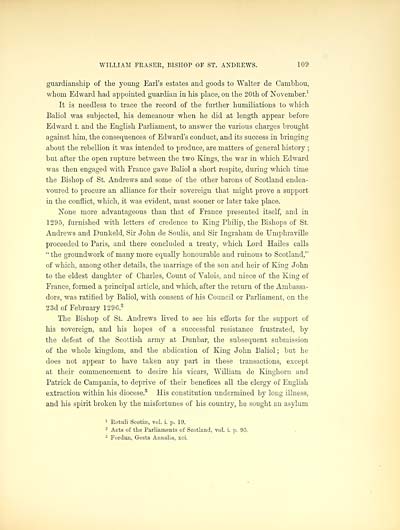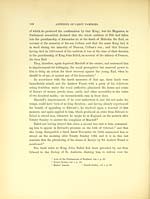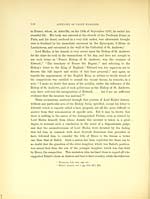Frasers of Philorth > Volume 2
(123)
Download files
Complete book:
Individual page:
Thumbnail gallery: Grid view | List view

WILLIAM FEASEE, BISHOP OF ST. ANDREWS. 109
guardianship of the young Earl's estates and goods to Walter de Cambhou,
whom Edward had appointed guardian in his place, on the 20th of November. 1
It is needless to trace the record of the further humiliations to which
Baliol was subjected, his demeanour when he did at length appear before
Edward I, and the English Parliament, to answer the various charges brought
against him, the consequences of Edward's conduct, and its success in bringing
about the rebellion it was intended to produce, are matters of general history ;
but after the open rupture between the two Kings, the war in which Edward
was then engaged with France gave Baliol a short respite, during which time
the Bishop of St. Andrews and some of the other barons of Scotland endea-
voured to procure an alliance for their sovereign that might prove a support
in the conflict, which, it was evident, must sooner or later take place.
None more advantageous than that of France presented itself, and in
1295, furnished with letters of credence to King Philip, the Bishops of St.
Andrews and Dunkeld, Sir John de Soulis, and Sir Ingraham de Umphraville
proceeded to Paris, and there concluded a treaty, which Lord Hailes calls
"the groundwork of many more equally honourable and ruinous to Scotland,"
of which, among other details, the marriage of the son and heir of King John
to the eldest daughter of Charles, Count of Valois, and niece of the King of
France, formed a principal article, and which, after the return of the Ambassa-
dors, was ratified by Baliol, with consent of his Council or Parliament, on the
23d of February 1296. 2
The Bishop of St. Andrews lived to see his efforts for the support of
his sovereign, and his hopes of a successful resistance frustrated, by
the defeat of the Scottish army at Dunbar, the subsequent submission
of the whole kingdom, and the abdication of King John Baliol; but he
does not appear to have taken any part in these transactions, except
at their commencement to desire his vicars, William de Kinghorn and
Patrick de Campania, to deprive of their benefices all the clergy of English
extraction within his diocese. 3 His constitution undermined by long illness,
and his spirit broken by the misfortunes of his country, he sought an asylum
1 Rotuli Scotife, vol. i. p. 19.
2 Acta of the Parliaments of Scotland, voL i. p. 95.
3 Fordun, Gtesta Annalia, xci.
guardianship of the young Earl's estates and goods to Walter de Cambhou,
whom Edward had appointed guardian in his place, on the 20th of November. 1
It is needless to trace the record of the further humiliations to which
Baliol was subjected, his demeanour when he did at length appear before
Edward I, and the English Parliament, to answer the various charges brought
against him, the consequences of Edward's conduct, and its success in bringing
about the rebellion it was intended to produce, are matters of general history ;
but after the open rupture between the two Kings, the war in which Edward
was then engaged with France gave Baliol a short respite, during which time
the Bishop of St. Andrews and some of the other barons of Scotland endea-
voured to procure an alliance for their sovereign that might prove a support
in the conflict, which, it was evident, must sooner or later take place.
None more advantageous than that of France presented itself, and in
1295, furnished with letters of credence to King Philip, the Bishops of St.
Andrews and Dunkeld, Sir John de Soulis, and Sir Ingraham de Umphraville
proceeded to Paris, and there concluded a treaty, which Lord Hailes calls
"the groundwork of many more equally honourable and ruinous to Scotland,"
of which, among other details, the marriage of the son and heir of King John
to the eldest daughter of Charles, Count of Valois, and niece of the King of
France, formed a principal article, and which, after the return of the Ambassa-
dors, was ratified by Baliol, with consent of his Council or Parliament, on the
23d of February 1296. 2
The Bishop of St. Andrews lived to see his efforts for the support of
his sovereign, and his hopes of a successful resistance frustrated, by
the defeat of the Scottish army at Dunbar, the subsequent submission
of the whole kingdom, and the abdication of King John Baliol; but he
does not appear to have taken any part in these transactions, except
at their commencement to desire his vicars, William de Kinghorn and
Patrick de Campania, to deprive of their benefices all the clergy of English
extraction within his diocese. 3 His constitution undermined by long illness,
and his spirit broken by the misfortunes of his country, he sought an asylum
1 Rotuli Scotife, vol. i. p. 19.
2 Acta of the Parliaments of Scotland, voL i. p. 95.
3 Fordun, Gtesta Annalia, xci.
Set display mode to:
![]() Universal Viewer |
Universal Viewer | ![]() Mirador |
Large image | Transcription
Mirador |
Large image | Transcription
Images and transcriptions on this page, including medium image downloads, may be used under the Creative Commons Attribution 4.0 International Licence unless otherwise stated. ![]()
| Histories of Scottish families > Frasers of Philorth > Volume 2 > (123) |
|---|
| Permanent URL | https://digital.nls.uk/96571732 |
|---|
| Attribution and copyright: |
|
|---|---|
| Description | A selection of almost 400 printed items relating to the history of Scottish families, mostly dating from the 19th and early 20th centuries. Includes memoirs, genealogies and clan histories, with a few produced by emigrant families. The earliest family history goes back to AD 916. |
|---|

